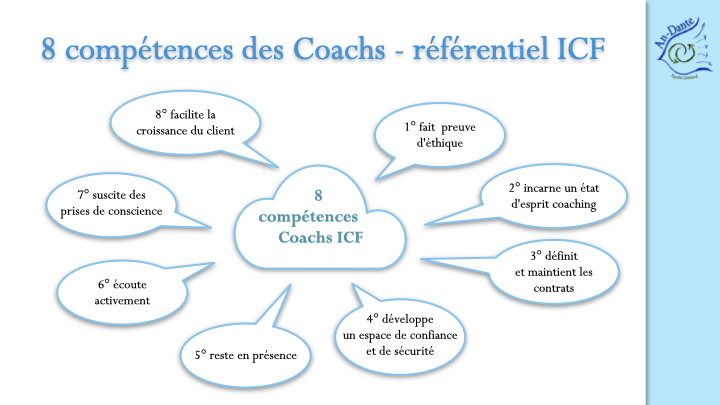Supervision and coaching are privileged moments for emergence.
What is emergence?
Depending on the points of view and metaphors, this can be the tip of the iceberg, which appears because one pays attention to it, it can also be what happens and what one did not expect and which one becomes aware of (skill 7).What arises… “pop”… in our mind or body, in an energy that can be very calm, as very sparkling or even gushing!
Emergence is the culmination of a journey from the known to the unknown, where the skills of letting go, curiosity, changing looks, connecting to feeling, being present at what is here and now are very useful.
From this first phase of travel emerges, during the second phase, another way of perceiving and seeing things, a new approach and putting into action with these new data.
For example, in a session, a coach realizes, via a scenario in the supervision space, that his posture in the space with his client acts contrary to the stated objective of his client. From this awareness was born an idea of different action at the next session. Next session completed, the coach testifies to the awareness of the client, and the acceleration of the progress towards his goal.
Parallel processes are a matter of work, which from what happens in the supervision space, makes it possible to reveal what is happening in the coaching space and which is not necessarily totally conscious for the coach and a fortiori the client.
In ANC terms, for example, a governance “in compensation” of the client can resonate with that of the coach and with that of the supervisor. And it is this emerged part that allows you to work on the immersed parts for the coach and the client. In a way, a cascade of governance. Or, to use a term of psychology a transfer and a countertransfer.
An example of a cascade is that of the search for recognition. The client vis-à-vis his coach “tell me that I am a good client”, the coach vis-à-vis his client “tell me that I am a good coach”, the coach vis-à-vis his supervisor “tell me that I am a good supervisor”…
Hence the crucial importance for the coach and the supervisor to work on his governance in compensation (Competence 5), in order not to be the toy but rather to use it for supervision and coaching work.

Compétences du référentiel ICF
- Histoires de SuperVision #1
- Histoires de SuperVision #2
- Histoires de SuperVision #3
- Histoires de SuperVision #4
- Histoires de SuperVision #5
- Histoires de SuperVision #6
- Histoires de SuperVision #7
- Histoires de SuperVision #8